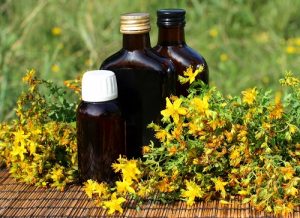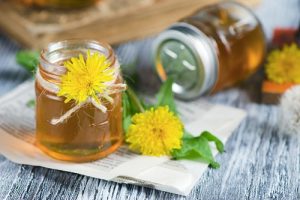By: Dominick L. Flarey, Ph.D, RN-BC, ANP-BC
Certified Adult Nurse Practitioner

Many people have heard of St John’s Wort (1) (Hypericum perforatum) because of its popularity as a depression remedy, but not everyone is aware of its other use as a burn remedy. First, a little history about this yellow flower. The herb is named after John the Baptist because it normally blooms around his birthday, June 24. The word ‘wort’ is the middle English word for ‘herb’. St. John’s wort is a plant that has been used medicinally for centuries. The most common use of St. John’s wort is for the treatment of depression. The active ingredients in St. John’s wort are thought to be hypericin (2) and hyperforin (3). Hypericin is thought to work by inhibiting the reuptake of serotonin, norepinephrine, and dopamine in the brain.
St. John’s Wort as a Burn Remedy
Long before it was used as a mood stabilizer, St. John’s Wort was traditionally used as a burn remedy. Herbalists in ancient times would make a paste from an infusion of St. John’s Wort and corn starch. This mixture was spread on the burn and dressed with clean bandages made of linen or cotton. Sometimes, an oil made from the flower petals was applied to an inflamed or burned area.
Although herbalists from centuries ago managed to figure out the various uses of this herb, they did not know why it worked. Today science can give us some insight as to why this herb works so well as a natural burn remedy, but its pharmacology is still not completely understood.
Here’s what we do know. The herb contains the chemical compound ‘hypericin’ which has anti-inflammatory, antimicrobial, and antibiotic properties. When applied topically to the skin, burns heal faster and with less scarring. Its anti-inflammatory properties make it a great sunburn remedy as well.
Many people report that they’ve had success using St. John’s Wort as a remedy for other skin ailments like psoriasis and warts. Medical studies are under way that may prove St. John’s Wort as a remedy for these skin ailments and some types of skin cancer.
St. John’s oil or cream is readily available from health food stores or may be ordered online. Store it in a cool dark place, and it should keep for up to two years. If you’re adventurous and prefer to make your own, follow this recipe:

* In blender grind one cup of fresh St. John’s Wort flowers to a pulp
* Place the pulp in a clean jar
* Cover with extra virgin olive oil
* Let the jar stand in a warm place, out of direct sunlight
* Shake/stir it daily for two weeks
* Use a cheesecloth to strain and bottle for use
The color should be a deep red. If it’s pink, use fresher flowers next time.
Burns are serious injuries, and if you ever experience even a minor burn, you should immediately apply first aid by immersing the burned area in cold water. Also, be sure to follow your doctor’s recommendations; however, you can consider using complementary therapies in addition to your doctor’s treatment. It’s quite likely that you will heal faster, and that there will be less scarring.
St. John’s Wort for Depression
The active ingredient in the herb is hypericin, which is thought to work by inhibiting the reuptake of certain neurotransmitters in the brain, including serotonin (4). Studies have shown that St John’s wort is effective in treating mild to moderate depression, and it may also be effective against anxiety and other mood disorders. It is a popular herbal remedy for depression that is thought to work by increasing levels of serotonin in the brain. It usually takes about 2-4 weeks for St. John’s wort to start working for depression, though some people may notice a difference sooner.
There is some evidence to suggest that St. John’s wort may act as a monoamine oxidase inhibitor. Monoamine oxidase inhibitors (MAOIs) are a class of drugs used to treat depression. They work by preventing the breakdown of monoamines, which are chemicals that play a role in mood and emotion. MAOIs can cause a variety of side effects, including fatigue, insomnia, and gastrointestinal problems.
There is a significant body of research indicating that St. John’s Wort is an effective treatment for mild to moderate depression. The mechanism of action is believed to be similar to that of other antidepressants, such as selective serotonin reuptake inhibitors (SSRIs), by increasing levels of neurotransmitters in the brain. Given the lack of serious side effects and the low cost of this herbal remedy, it should be considered as a first-line treatment option for depression.
The dosage of St. John’s wort for depression can vary depending on the severity of the depression and the individual’s response to the herb. A common starting dose is 300 mg per day, divided into three doses. If the depression is mild, this dose may be sufficient. If the depression is more severe, the dose may be increased to 600 mg per day. Typically, patients will take St. John’s wort for at least six weeks to see if it is effective for their depression. If the patient does not see any improvement after six weeks, they may discontinue use of the herb.

Can St. John’s Wort be taken along with Benzodiazepines? Benzodiazepines are a class of drugs that are commonly used to treat anxiety and other mental health conditions. There is some evidence to suggest that this herb may interact with benzodiazepines, and it is therefore important to speak with a healthcare professional before taking these two substances together.
Side Effects and Precautions
The most common side effects of taking St. John’s Wort for depression are gastrointestinal upset, fatigue, and dizziness. Less common side effects include headache, dry mouth, and constipation. Some people may also experience photosensitivity, meaning their skin becomes more sensitive to sunlight. While most side effects are mild and go away on their own, more serious side effects have been reported in rare cases. These include liver damage, mania, and serotonin syndrome.
There are some medications that St. John’s Wort can interact with. These include:
– Antidepressants
– Birth control pills
– Blood thinners
– Cancer medication
– Cyclosporine
– Cancer medications
– Heart medications
– HIV/AIDS medications
If you are taking any of these medications, it is important to talk to your doctor or health care provider before taking St. John’s Wort.
There are a few foods that St. John’s Wort cannot be taken with. These include anything high in tyramine, such as aged cheese, red wine, and cured meats. These foods can cause an increase in blood pressure when taken with the herb. There are other food interactions that are known with St. John’s wort. The herb can decrease the absorption of fat-soluble vitamins, such as vitamins A, D, E, and K. It can also reduce the effectiveness of birth control pills, and it may increase the metabolism of certain drugs, such as antidepressants, leading to reduced efficacy. Therefore, it is best to avoid taking St. John’s wort with birth control pills or other medications.
Is drinking alcohol permissible when taking St. John’s Wort? There are no definitive studies that indicate whether it is safe to drink alcohol while taking St. John’s Wort. However, it is generally recommended that people avoid drinking alcohol while taking any medication, as alcohol can interfere with the body’s ability to process and absorb the medication. Additionally, alcohol can increase the risk of side effects from medications, including St. John’s Wort. Therefore, it is advisable to err on the side of caution and avoid drinking alcohol while taking this supplement.
The side effects of this herb can be divided into two main categories: those that are caused by the plant itself, and those that are caused by the interaction between the plant and other medications. The most common side effect of St. John’s Wort is gastrointestinal upset, which can include nausea, vomiting, and diarrhea. Other side effects that have been reported include headaches, dizziness, insomnia, and anxiety.
Other Uses for St. John’s Wort
The modern use for St. John’s Wort besides treating mild to moderate depression and burns is that it has also been traditionally used for nerve pain, such as sciatica and neuralgia and used for insomnia and menopausal symptoms.
Neuropathic Pain
St John’s Wort has been used traditionally in the treatment of neuropathic pain (5), due to its purported antinociceptive and anti-inflammatory properties. It is thought that these effects are derived from its constituent hypericin, which is a flavonoid found in the plant. Hypericin is a potent inhibitor of voltage-gated sodium channels, which may reduce neuronal hyperexcitability and therefore alleviate nerve pain.

St John’s Wort has been the subject of research in terms of its efficacy in providing relief for nerve pain. Studies have suggested that this herbal remedy can provide significant levels of analgesia when taken regularly and in doses that are consistent with the recommended guidelines. Additionally, the active ingredient Hypericum perforatum has been shown to have anti-inflammatory properties which may be beneficial in reducing inflammation caused by nerve damage and thus provide alleviation of associated symptoms such as pain.
Insomnia
St. John’s Wort, is an herbal remedy that has been used for centuries to treat insomnia. It works by modulating serotonin pathways and interacting with neurotransmitter receptors in the brain, resulting in improved sleep quality. Studies have shown its efficacy in reducing symptoms of primary insomnia, particularly when combined with other therapies such as cognitive-behavioral therapy.
St John’s Wort has been documented to have positive effects on the treatment of insomnia, with some studies suggesting that it could be as effective as traditional pharmacological treatments. The active constituents in this herb, including hyperforin, flavonoids and terpenoids, are believed to be responsible for its sedative effect. It is thought to modulate the serotonergic system, which plays a role in sleep-wake regulation, particularly through its effect on the hypothalamic-pituitary-adrenal axis.
Menopausal Symptoms
The herb has been evaluated for its efficacy in alleviating menopausal symptoms, with research demonstrating that it can be an effective treatment for reducing the severity of hot flashes. The active components found in St. John’s Wort are believed to be Hypericins and hyperforin, which have been suggested to possess a range of pharmacological activities, including modulating serotonin and opioid receptor activity and increasing GABA neurotransmitter levels. It is also theorized that the active constituents of St John’s Wort, particularly hypericin and hyperforin, possess potent phytoestrogenic properties which may account for its efficacy in alleviating menopausal symptomatology.
Conclusion
In conclusion, St. John’s wort is a beneficial herb with many potential uses. It has been used since ancient times to treat mental health disorders, may have antifungal properties, and can be used to treat skin wounds and burns, as well as neuropathic pain and menopausal symptoms. Additionally, research suggests that St. John’s wort may be useful for treating symptoms of menopause and improving moods and cognitive function in the elderly. With its many potential benefits, it is becoming increasingly popular as an alternative remedy for a variety of ailments. Certified Holistic Nurses will find the information in this article to be particularly useful in their professional practices especially related to education of their clients.
Are you a Registered Professional Nurse who has an interest in learning more about Holistic and Integrative Nursing Practice? The American Institute of Health Care Professionals, Inc. offers a full curriculum of continuing education courses leading to a Certification in Holistic and Integrative Nursing Practice. You may preview the program by accessing here.
References
- St. John’s Wort. National Center for Complementary and Integrative Health. US Department of Health and Human Services. National Institutes of Health. access here
- Hypericin. Wikipedia. access here
- Hyperforin. National Library of Medicine. access here
- Serotonin. The Cleveland Clinic. March 18, 2022. access here
- Neuropathic Pain. The Cleveland Clinic. December 7, 2020. access here
Suggested Readings
1. Clinical relevance of St. John’s Wort interactions revisited. Simon Nicolussi, et. al. British Journal of Pharmacology. November 19, 2019. Vol 177 (6):1212-1226. access here
2. Hypericum perforatum (St John’s wort) beyond depression: A therapeutic perspective for pain conditions. Nicoletta Galeotti. Journal of Ethnopharmacology. March 2017. Vol 200 (22):136-146. access here
3. St. John’s Wort. The Mayo Clinic. By: Mayo Clinic Staff. February 13, 2021. access here
